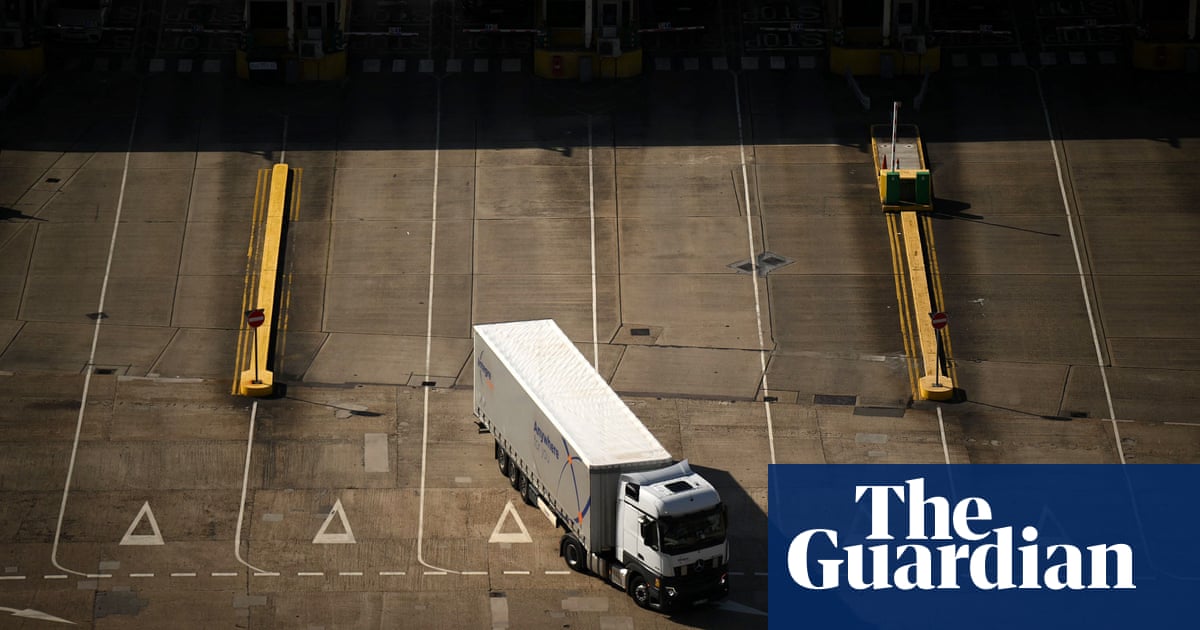
A lorry load of potato crisps destined for a Northern Ireland supermarket was held up for two days because of Brexit checks, MPs have been told.
The Conservative MP Sir Bernard Jenkin made the claim at the House of Commons public accounts committee (PAC) as the Labour party was told of the “disastrous” impact of the Northern Ireland protocol.
Hauliers told the shadow chancellor of the duchy of Lancaster, Rachel Reeves, that Northern Irish Brexit checks had caused shortages of food, deliveries of equipment to the NHS and farm machinery, despite claims by Boris Johnson it was all going “smoothly”.
However, officials told the PAC that Brexit operations were running much better than anticipated in Dover with no holdups on the Kent roads and 200 lorries turned away over a two-day period.
Emma Churchill, the head of the government border and protocol group, said 636 drivers had been fined £300 in on-the-spot penalties over the past three weeks over the new Kent access permit required to get into the county in order to cross the Channel.
She was speaking as research by the Chartered Institute of Procurement and Supply found that 60% of firms reported delays to shipments going from the EU to Britain.
The data around port operations comes amid tales of behind-the-scenes chaos, job losses and financial burdens in Northern Ireland appearing overnight because of Brexit.
“A lorry load of potato crisps was held up for two days because the haulier couldn’t prove the potatoes … had not been imported into the UK from somewhere else,” Jenkin told the committee.
An ardent supporter of Brexit, he said the “whole point of the protocol was to prevent goods at risk of entering the Republic of Ireland”, not to check items that would remain in Northern Ireland.
“This is ridiculous, this isn’t a threat to the single market. There is no purpose in applying the union customs code to these goods,” he said.
At issue is the overnight introduction of EU rules on goods travelling to Northern Ireland from Great Britain.
Richard Burnett, the chief executive of the Road Haulage Association, said the income of Northern Ireland hauliers and freight companies had dropped an estimated £20m since 1 January.
“These are not teething problems. These are structural problems,” he said in response to a statement by the Northern Ireland secretary, Brandon Lewis, that many of the problems would be ironed out during the six-month grace period.
Uel Nesbitt, who runs a freight transport operation in Northern Ireland, said politicians in Westminster did not have a clue.
He said the choke points were not the ports, whether Belfast or Dover, but the ports and distribution centres where goods were not even getting on to lorries because paperwork was not in order.
“People are not listening to us. If it’s coming from the top that it’s all fine, that’s what they think. We had the prime minister saying yesterday things are all sweet and dandy. Well he hasn’t got a scooby doo of what’s going on. Come up here, Boris Johnson, and see for yourself because it is a complete car crash,” said Nesbitt.
Hauliers in Northern Ireland are urging the UK government to try to renegotiate the interpretation of the protocol. Burnett said extending the grace period, as some have suggested, was just “kicking the problem down the road”.
One haulier, John Esler, told the Labour briefing that the overnight change had been devastating.
His income has dropped 40% in the past three weeks. “Northern Ireland did not vote for Brexit. I did not vote for Brexit. But I suspect our current secretary of state did, Michael Gove did, Boris Johnson most certainly did – but they ignore us.
“If we do not get help, it will be P45s by Easter. It is as blunt as that.”
Others blamed the two false starts for Brexit, claiming that meant British companies had not got ready for the Northern Ireland protocol which had been agreed a year before the trade deal.












